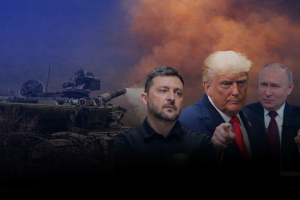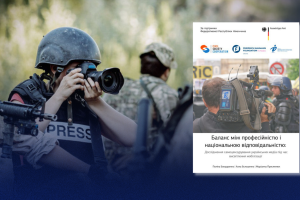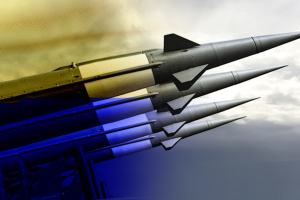Crimea in the public opinion of Ukrainians
A nationwide public opinion poll of Ukrainians was jointly conducted by the Ilko Kucheriv Democratic Initiatives Foundation and the Razumkov Center sociological service on August 16-22, 2018 in all regions of Ukraine, excluding the Ukrainian territory of Crimea occupied by Russia and the occupied territories of Donetsk and Luhansk oblasts. 2,019 respondents aged 18 years and older were polled. The theoretical sample error doesn’t exceed 2.3%.
For comparison, findings from a previous nationwide survey conducted jointly by the Ilko Kucheriv Democratic Initiatives Foundation and the Razumkov Center sociological service on May 11-16, 2016 were included.
The survey was conducted with the financial support of the MATRA project of the Embassy of the Netherlands in Ukraine.
A prevalent majority (69%) of Ukraine’s population believes that the Crimea should be a part of Ukraine, and this percentage remains unchanged in comparison to May 2016. Twelve percent support the existence of the Crimea as a de-facto independent state (with as many as in 2016), and 4% recognize it as belonging to Russia (7% in 2016). Regional differences exist regarding the question of Crimea’s status: 80% of those polled in the western and central regions say that the Crimea should belong to Ukraine; 56% in the south, and 45% in the east. Concurrently, an absolute minority of respondents in the south and east support the Crimea belonging to Russia – 3% in the south and 10% in the east. However, a certain part of the population in these regions believes that the Crimea should be independent (24% in the south, and 18% in the east).
A majority of the Ukrainian population believes that it is an unacceptable offer to “trade” the Crimea for Donbas. That is, to recognize Russia’s annexation of Crimea “in exchange for” Russia to withdraw from the occupied territories of the Donbas (only 16% support this “tradeoff”). The most who are categorically against this option for peacemaking are in the west (81%) and in the center (77%). Residents in the east (41%) and south (56%) are also mainly against this version, although in these regions a certain portion of residents agree that they “must agree with any proposal that will lead to peace, even at the expense of the Crimea” (23% in the south, and 18% in the east).
Optimistic assessments of the prospect for Ukraine to regain control over the Crimea exceeded pessimistic valuations: 48% of Ukrainian citizens believe this reversion is realistic, 36% don’t believe in this possibility. At the same time, only 5% believe that this reversion is possible in the near future (in May 2016, such optimists stood at 22%). The undecided level of opinion somewhat rose on this issue (from 8% to 17%).
The preponderance of optimistic expectations about the possibility of returning Crimea is formed mainly by residents of the west and the center (among whom are respectively, 65% and 54%, who believe the return of the Crimea is realistic), whereas among residents of the south and east, inversely, opinions about the unlikelihood or impossibility of such developments prevail (in both regions, 51% of those polled voiced a pessimistic opinion).
At the same time, only a minority of the population (34%) is for restoring financial subsidies for the Crimea from the state budget should it return to Ukraine; substantially more (49%) don’t support this measure. Even among those respondents who were in favor of restoring Crimea belonging to Ukraine, the agreement level to finance the cost of maintaining the Crimea was less than half of those polled (43%), whereas 41% of respondents don’t support such expenses. Moreover, in comparison with May 2016, the level of consent for subsidized support of the Crimea has dropped (by 7%) and the level of disagreement slightly increased (by 6%).
Personal readiness to financially support certain programs aimed at integrating the Crimea to Ukraine were voiced by 22% of citizens; the most in the western regions (29%), the least in the southern (10%).
Respondents who believe that it is realistic for Ukraine to regain control over the Crimea named the following conducive factors most frequently: a change of power in Russia (39%), imposing tighter sanctions on Russia (32%) and raising the standard of living in Ukraine (31%). These top three factors remain unchanged in comparison to May 2016. Only the hope for a change in power in Russia slightly rose and the impact of raising standard of living in Ukraine fell. Only 10% of the population support the forcible return of the Crimea to Ukraine. Moreover, this share slightly decreased (from 14%) in comparison to May 2016.
The idea of the possibility to return Crimea back into the fold of Ukraine differs among residents regionally. In particular, the hope for a change of power in Russia is most prevalent among respondents in the west (41%) and center (45%), whereas in the other regions, significantly less hope is found: 22% in the south and 28% in the east. However, the most prevalent opinion (54%) among residents of the south is the significance of improving prosperity in Ukraine. Residents in the western region (42%) place more hope in imposing tighter sanctions, whereas in other regions this option is chosen substantially less frequently (30% in the center, 24% in the east and 17% in the south).
Half of Ukrainian citizens support the idea of creating Crimean-Tatar autonomy inside the Crimea, in case of de-occupation of the peninsula; while 28% don’t support this prospect. The biggest support for Crimean-Tatar autonomy in the Crimea is found in the western region (56%) and the center (59%), whereas in the south and east 36-38% approve of this idea (the level of disagreement with the idea in these regions is approximately the same).
A significant part of the population (41%) is for simplifying the most the entry/exit procedure to and from the Crimea for Ukrainian citizens, including for Crimean residents; 30% of those surveyed completely accept the current entry/exit regime, and 11% call for a stricter system so that entry/exit permission to and from the Crimea is provided only with special permits and justified reason. Residents of the western regions foremost support the demand for a stricter crossing procedure system at the line of separation with occupied Crimea (26%), and liberalization of the system is supported by the majority of residents of the south (51%) and the east (50%) of Ukraine.








